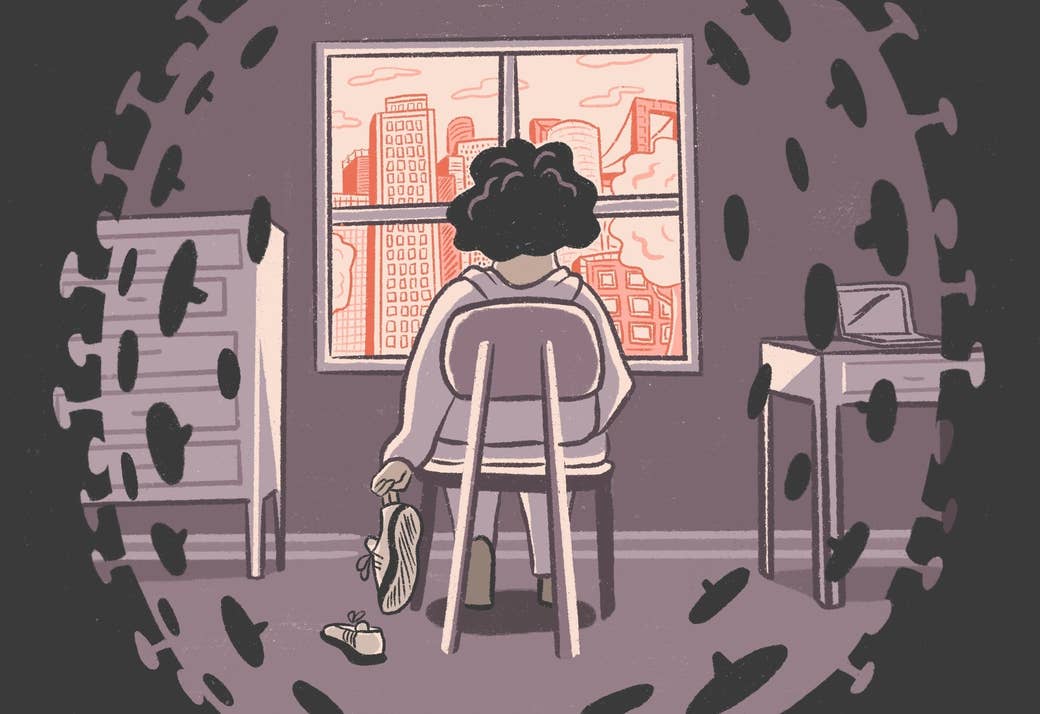
The journalists at BuzzFeed News are proud to bring you trustworthy and relevant reporting about the coronavirus. To help keep this news free, become a member and sign up for our newsletter, Outbreak Today.
On a good day, I don’t think about food much.
That’s the thing I like the most these days: the freedom to think about something — anything! — other than what I can eat and can’t eat and will eat and won’t eat and how many calories every bite has and how to work it off. Thinking about all of that constantly was my life for nearly a decade. Until finally, within the last year or so, through work with my own therapist and a therapy group staffed with eating disorder specialists and nutritionists, I started to find my way to recovery.
I work out now because it feels good, not because I feel like I have to — or, at least that’s the goal. I walk to work, and I think about how the air feels on my skin and appreciate moving my body in low-impact ways. I cook for myself and enjoy the flavors when I eat it.
But so much of my recovery is routine-based. And suddenly, with the coronavirus pandemic sweeping across the world, routine — for everyone, everywhere — is completely out the window. There’s no walking to work, no picking up lunch with a friend, no access to the gym, and constant talk about food. My recovery — and the recovery and safety of millions of people with eating disorders — is being tested.
On one particular day earlier this week, I worked out at home for far too long and ate far too little. It wasn’t my intention, but subconsciously, in the middle of a pandemic I can’t control, feeling trapped inside my house and anxious about the state of the world, taking extreme control over my food and exercise felt like an outlet. Today, I’m in pain from pushing my body too far, and I’m not alone.
The coronavirus outbreak has put people with eating disorders and people recovering from them in perilous positions. We’re without normal access to recovery groups, and in the line of fire for all sorts of triggering situations and conversations while socially distancing and quarantining. There’s constant talk about food: Restaurants are closing, grocery stores are struggling to keep food in stock, and public health experts are encouraging people to buy shelf-stable products and make meals at home. There’s no more in-person therapy — but there is a constant discourse about at-home workouts.
An estimated 1 in 10 people in the United States have eating disorders, though many experts believe that number is much higher, as many people with disordered eating aren’t diagnosed. Anorexia is the most lethal mental illness, and many people with eating disorders are immunocompromised, putting them squarely in the group of people for whom COVID-19, the disease caused by the coronavirus, could be most dangerous.
“We tell our clients all the time, ‘Don't isolate,’ you know, ‘Reach out for support,’” said Christie Dondero Bettwy, the executive director of Rock Recovery, an eating disorder treatment group. (Full disclosure: I used to be a Rock client.) “Like, ‘Your disease wants you to isolate, but you shouldn't listen to it,’ and now society's like, ‘Wait, you need to isolate.’”
For many people, Dondero Bettwy said, isolating to help stop the spread of the coronavirus can mean losing some accountability for sticking to a meal plan. “You can do [some of that] virtually, but if you have built-in accountability, like you go to work and eat with your coworkers, now you're home and have no one to eat with,” she said.
Like many therapists and support groups across the country, Rock Recovery has moved all their sessions to virtual video calls, keeping groups going without in-person interactions. But a central part of Rock group sessions is the group meal people share during each meeting, and now members have to prepare their own before the session.
“What we're having clients do is hold their meal up to the camera when we go around for the check-in, and talking about what they're eating and why,” she said. “So it’s adding actually a really unique, interesting level of, like, you're cooking your own meal, you're not getting what someone gave you, and how challenging is it? Is it challenging enough?”
"I think it's kind of very hard to maintain that kind of recovery when it feels like the world is ending."
Katelin Penner, a 19-year-old college student and organizer recovering from bulimia, told me she’s struggling with motivation to keep working at recovery.
“I think it's kind of very hard to maintain that kind of recovery when it feels like the world is ending,” she said. “Some part of me is like, ‘Why do I even do this?’ It’s so hard and the world is going to be over tomorrow. … It’s like a nightmare.”
Penner is home with her family right now, and she said she’s starting to get anxious as the produce from their most recent grocery run gets low — fresh fruits and vegetables feel like safe foods for her right now — and that having the pantry full is stressful.
“As someone who has a history with bingeing … my operation has traditionally been to keep as little food in my house as possible,” she said. “But I think now, really, that's not a good way to operate.”

Penner and some of her friends who also have histories of eating disorders are thinking of putting together a virtual support group, and she said she’s just trying to be conscious about not isolating herself, even if she’s quarantined.
“I think it's really hard to navigate because eating disorders do thrive in silence,” she said. “This is kind of like the perfect storm for that silence to get as loud as humanly possible.”
One particular challenge the coronavirus presents is that, as part of quarantining and isolating, people are stocking up on self-stable foods like rice, beans, and pasta — classic fear foods for people with eating disorders (myself included).
“That was definitely difficult,” said Savanna Jones, a 22-year-old law student recovering from anorexia. “Like at the grocery store, I was like putting all these things in my cart, [and] my boyfriend's like, ‘You can’t buy five packages of salad!’”

Jones said she’s also realized that although she wasn’t consciously counting steps, she was very aware of how much she was walking before being in quarantine. Now that she isn’t walking to school, she was starting to think she hadn’t “earned” her food.
“I find myself, like, having to say that it is okay to eat. You never have to earn this,” she said. “Yes, your body's just ready to be hungry, even though you haven't moved. That’s how bodies work.”
To help keep her mind away from counting numbers, Jones said she’s been taking walks when she can, and leaving her phone at home.
Veronica, a 22-year-old grad student and journalist who asked to be identified only by her first name for privacy, said she’s also been thinking about how people quarantining with a partner now have to face eating in front of other people more often than they might be comfortable with (the pressure of someone watching what and how much you eat is something many people with eating disorders hate).
“I'm lucky, I've been with my partner for three years. So he already knows the whole shebang,” she said. “But I find myself thinking about, like, what if I’d only been dating this kid for six months and I went from going out to dinner once a week or twice a week to eating every single meal in front of each other?”
Veronica was partially hospitalized for her eating disorder until around two months ago, and said she has emerged into the weirdest possible world for recovery. Accessing foods she’s comfortable with has been difficult.
“I'll be like, I want to go out and get spinach! And [my partner] is like, ‘Don't go get spinach, you might kill all the old people in your apartment!’” she said. But quarantining has also been proof for Veronica that recovery is possible and that it’s working.
"Sitting on the couch and watching The Sopranos and eating ice cream and not crying has been, like, really something I'm happy with."
“I'm kind of proud of myself,” she said. “Sitting on the couch and watching The Sopranos and eating ice cream and not crying has been, like, really something I'm happy with. And I wish I could call my old treatment team and kind of be like, ‘I can do this.’”
Many eating disorder recovery experts work with their clients on intuitive eating, a theory that discards all diets and restrictive eating and embraces eating what your body wants, when your body wants it.
“We always say variety, balance, and moderation are sort of the three tenants we hold to with intuitive eating,” Dondero Bettwy said. But she acknowledges there is a difference in getting comfortable with eating fear foods here and there, versus having to eat them day in and day out.
“I think it's important to remember that quote-unquote ‘normal eating’ does vary day to day, week to week, month to month, based on access and lifestyle,” she said.
The coronavirus outbreak is not only making it more difficult for people to access treatment but also to raise eating disorder awareness. Recently, the National Eating Disorder Association canceled a number of their annual fundraising walks.
“That was a huge consideration for us, you know, not just the basic risk of having large gatherings, but recognizing that we have many people in our communities who are at higher risk because of [immune] deficiencies,” said NEDA CEO Claire Mysko. “We’re really trying to raise awareness about this fact without creating more anxiety.”
Berkley Wallace, a 27-year-old living in Los Angeles who’s currently in full-time treatment for her eating disorder, said her care facility has implemented new cleaning standards and now, in therapy sessions, clients sit with every other chair empty to distance themselves. She also said doctors have reminded her and people in her treatment group that they could face dire consequences if they contract the coronavirus, because they may have compromised immune systems. Otherwise, Wallace said not much has changed at her treatment facility. She thinks her care team is trying to keep the news quiet so as not to pile on when people are already so anxious and trying to recover.

“There's already such a high level of anxiety that it's hard to take on any more,” she said. “When you're in your eating disorder, like, you are okay with the idea of being sick because you're in a state of being sick. So I feel like we were in a bubble in the sense that we didn't realize how serious it was.”
As the seriousness of the coronavirus has become clear, Wallace has considered staying home from treatment to avoid potentially contracting or spreading the disease, but if she doesn’t go to her facility for five days in a row, her insurance will no longer cover the treatment. So she continues to go, despite concerns about her health and the health of other people in her facility.
“There's been a lot of people in my life … [who are] like, ‘That’s so great, you can just go, you have therapy already built into your everyday life. You can go work through this stuff.’ Yeah. Yeah, I guess so,” Wallace said. “I didn’t feel lucky until now.”
Dondero Bettwy, of Rock Recovery, said it makes sense to her that people with eating disorders or people in recovery for them are feeling the pressure of the pandemic.
"Sometimes I think we're channeling our anxiety about the uncertainty about corona into the food."
“Sometimes I think we're channeling our anxiety about the uncertainty about corona into the food,” she said. “It's easy to fixate on it and stress about it because it's tangible, it's happening everyday, it's in the here and now, and it seems like a nice little scapegoat for all of our uncertainty in life right now.”
Jones, the law student, said she certainly thinks that’s the case for her.
“[My eating disorder] was definitely for me, like, a big control thing where I want to feel control over my situation,” she said. “I think that is why it's really coming up a lot now, as I’m like, there's literally nothing that’s in my control right now. I'm in quarantine. I'm trying to take these classes online that are so hard, my professors are old, they don't know how to use computers.”
I think it’s a “control thing” for me, too, but Dondero Bettwy reminded me of something we talked about in treatment often. “A really important thing to remember in recovery is sometimes today feels like it's going to be forever, and it's just not true,” she said.
But the particular horror of coronavirus is that all of this — the isolation, the pasta, the virtual therapy sessions — has no end date. It has to happen, but it’s still scary and triggering and new.
I’m trying to stay inside as much as possible, but when the neighborhood is quiet, I’ve been going outside for fresh air on walks by myself, and trying to apply the things that worked for me pre-coronavirus to this strange new world: feeling the air on my skin, moving my body in gentle ways, and reminding myself that today — even if it’s a long time — isn’t forever. ●
If you’re dealing with an eating disorder and need someone to talk to, the National Eating Disorders Association helpline is 1-800-931-2237; for 24/7 crisis support, text “NEDA” to 741741.

